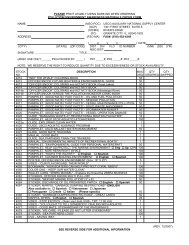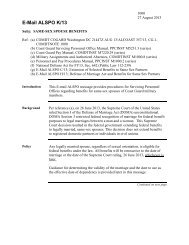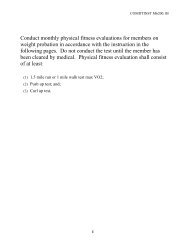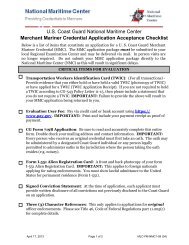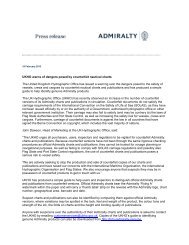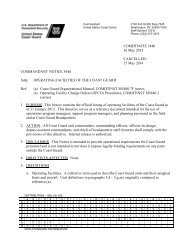Immunotherapy Safety for the Primary Care ... - U.S. Coast Guard
Immunotherapy Safety for the Primary Care ... - U.S. Coast Guard
Immunotherapy Safety for the Primary Care ... - U.S. Coast Guard
You also want an ePaper? Increase the reach of your titles
YUMPU automatically turns print PDFs into web optimized ePapers that Google loves.
10. Those patients having <strong>the</strong>ir doses increased towards maintenance<br />
are most likely to have reactions, but even long term patients<br />
occasionally have serious reactions.<br />
11. Serious local or generalized reactions may require prompt<br />
treatment. If you should experience a serious reaction (hives, trouble<br />
breathing or swallowing) while in <strong>the</strong> clinic we will implement<br />
treatment as far as possible to stabilize or resolve <strong>the</strong> problem. Be<br />
aware that should this situation occur, you would be required to be<br />
observed <strong>for</strong> several hours to be sure that you do not develop a delayed<br />
reaction to your allergens requiring fur<strong>the</strong>r treatment. You may be<br />
observed in this clinic, or you may be transferred emergently to a<br />
higher level of care <strong>for</strong> ongoing treatment depending on <strong>the</strong> severity of<br />
your reaction.<br />
12. Should you have a history of systemic reactions, you need to<br />
in<strong>for</strong>m <strong>the</strong> staff promptly. Please make <strong>the</strong> staff aware if you do not<br />
have an epinephrine autoinjector (Epi-Pen or TwinJect) or do not have a<br />
ready knowledge of when and how to use it.<br />
13. If you should experience a delayed reaction after leaving <strong>the</strong><br />
clinic, notify <strong>the</strong> staff on your next visit. This is required to<br />
assure that you receive <strong>the</strong> correct amount of extract and prevent<br />
worsening reactions.<br />
14. If you have started on any new medications, notify <strong>the</strong> staff<br />
immediately. The medications we use to treat a severe allergic<br />
reaction may NOT work as efficiently if you are on a class of drugs<br />
known as beta-blockers or ACE inhibitors. This could be a lifethreatening<br />
situation. If your primary physician feels you absolutely<br />
must be on beta blockers, your prescribing Allergist must review this<br />
fact with you and your primary care provider/specialist be<strong>for</strong>e we can<br />
continue your allergy shots.<br />
15. Significant illness with fevers over 100 degrees, respiratory<br />
illnesses, and worsened asthma symptoms are all conditions that require<br />
you notify staff of be<strong>for</strong>e receiving your allergy shot. These<br />
conditions may precipitate serious reactions after allergy shots. It<br />
is best to wait until <strong>the</strong>se conditions resolve or stabilize be<strong>for</strong>e<br />
continuing.<br />
I understand <strong>the</strong> above in<strong>for</strong>mation and will comply with <strong>the</strong> clinic<br />
policies.<br />
_____________________________<br />
Patient's Signature<br />
____________________<br />
Date<br />
_____________________________<br />
Witness<br />
____________________<br />
Date




